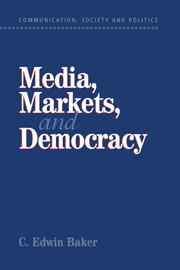Book contents
- Frontmatter
- Contents
- Preface
- PART I SERVING AUDIENCES
- 1 Not Toasters: The Special Nature of Media Products
- 2 Public Goods and Monopolistic Competition
- 3 The Problem of Externalities
- 4 The Market as a Measure of Preferences
- 5 Where To? Policy Responses
- PART II SERVING CITIZENS
- PART III AN ILLUSTRATION: INTERNATIONAL TRADE
- CONCLUSION
- Notes
- Index
3 - The Problem of Externalities
Published online by Cambridge University Press: 10 December 2009
- Frontmatter
- Contents
- Preface
- PART I SERVING AUDIENCES
- 1 Not Toasters: The Special Nature of Media Products
- 2 Public Goods and Monopolistic Competition
- 3 The Problem of Externalities
- 4 The Market as a Measure of Preferences
- 5 Where To? Policy Responses
- PART II SERVING CITIZENS
- PART III AN ILLUSTRATION: INTERNATIONAL TRADE
- CONCLUSION
- Notes
- Index
Summary
The most commonly recognized reason for markets to produce “inefficient” or non-wealth-maximizing results is “transaction costs” that prevent some costs and some benefits from being brought to bear on the actions or decision making of market participants. The consequence of this failure is often described as an externality. Pollution is a standard example of a negative externality; a beautiful landscape freely observable by the public exemplifies a positive externality. If negative impacts of an activity are not brought to bear on the decision making of the actor, the predictable result is too much of an activity. The converse is true for positive externalities; if positive effects are not brought to bear, not made into an incentive, the result is too little of the activity. Failure to bring these effects to bear can also lead the actor to behave in a less than optimal manner (e.g., to fail to install a cheap and effective pollution control device).
“Giving the audience what it wants” can only sensibly mean doing so within some cost constraint. Usually the person who invokes the notion means that the audience should get what it wants given its willingness to pay the cost. Many people would like to see Broadway-quality productions at their neighborhood theaters, but this observation is not thought to demonstrate that giving audiences what they want requires making this opportunity available to them for the cost of a movie ticket. “Giving the audience what it wants” means giving it a Broadway-quality production only if the audience is willing to pay its real or actual cost.
- Type
- Chapter
- Information
- Media, Markets, and Democracy , pp. 41 - 62Publisher: Cambridge University PressPrint publication year: 2001



